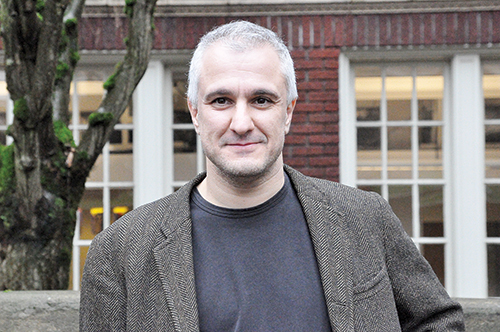
In a supposedly secular nation that still operates under an array of religious ideologies, atheism is always a hot topic.
Peter Boghossian, an adjunct professor in the Department of Philosophy, is bringing the discussion to the classroom with his new class, titled “New Atheism.”
The first of its kind, the class is a community partnership with the Richard Dawkins Foundation for Reason and Science.
Students in the “New Atheism” class critically examine Dawkins’ book A Devil’s Chaplain and write an article about it. Boghossian then selects the best pieces from the class and submits them to the foundation for potential publication on its website.
The class usually features a guest speaker each week, who discusses various topics related to the class, from intelligent design and creationism to Christianity and what new atheism actually is.
Boghossian said the class will also feature Skype lectures with a few famous people from around the world.
Boghossian hopes to bring in a couple of Christian and Muslim apologists, or defenders of faith, to speak with the class.
“We study the works of notable Christian apologists and Muslim apologists, and then we engage those ideas against a framework of critical rationality,” he said.
Boghossian said that this is not the kind of class that students should just take on a whim. If they are interested in the subject, there is a course titled “Atheism,” which he suggests students take if they have an interest.
“‘New Atheism’ is a very specialized course. It has prerequisites, and it assumes some familiarity with the content and subject matter,” Boghossian said. “Everyone in that class truly wants to be there.”
“Atheism” is also designed and taught by Boghossian. He describes it as an overview of subjects like intelligent design, creationism, cosmological arguments for the existence of a god and compatibility between faith and reason. Throughout the term, students examine a wide variety of subjects that fall within the rubric of atheism.
Boghossian teaches the two classes in different formats. “Atheism” is taught as a participatory lecture, where Boghossian lectures and students are encouraged to ask questions as he goes along.
“New Atheism” looks at context arguments, usually in the form of a video debate between a famous Christian apologist and a famous atheist. They use tools developed in the course to analyze the arguments and decide whether they’re coherent and make sense. The format is supplemented by guest speakers.
“‘New Atheism’ is interesting because it’s a community partnership, and it [will hopefully] culminate in a paper that students will have an opportunity to publish,” Boghossian said.
In addition to the Dawkins foundation, the class is also hoping to develop community relationships with the James Randi Educational Foundation and Michael Shermer, a noted skeptic.
“All these organizations work to promote reason and rationality,” Boghossian said.
Boghossian is hoping to turn the “Atheism” course into a MOOC, a massive open online course. This means that anyone, anywhere in the world would be able to take the course online.
Boghossian said that no one else is offering a MOOC in atheism.
“It would be a tremendous opportunity to shine a spotlight on ourselves [and on PSU] as a leader in thinking, and extend our reach from ‘let knowledge serve the city’ to ‘let knowledge serve the global community,’” Boghossian said.
“[We’d] expose people all over the world to ideas that literally they have never even heard of or been exposed to,” he added.

